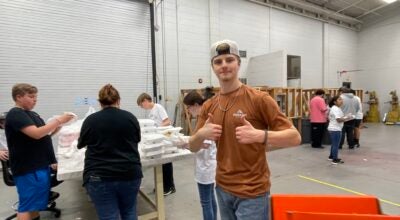Potato farms sprout up here
Published 7:41 pm Tuesday, June 12, 2012

Anthony Walther, of Walther Farms, shows off some of the potatoes grown on his operation on Dothan Road. Walther and his brother, Jeremy, have been farming potatoes in Decatur County for seven years. Many of their potatoes are sold to Frito-Lay, which uses them to make potato chips. |Brennan Leathers
Georgia is known for its peaches, its poultry, its peanuts and pecans — but not so much for its potatoes.
Potatoes haven’t traditionally been grown on a widespread basis in Georgia. Their peak was around 1950, when about 5,000 acres of potatoes were harvested statewide. But the crop dwindled, so much so that it stopped being tracked in 1965, according to the National Agricultural Statistics Service.
However, at least two farming operations in Decatur County have made potatoes a successful crop.
Walther Farms, a family-owned business based in Michigan, has farms in several states, including Georgia, Florida, Michigan, Illinois and Indiana.
Brothers Anthony and Jeremy Walther, ages 34 and 31, respectively, have been farming potatoes in Decatur and Seminole counties for seven years. They are currently leasing about 1,700 acres locally — they plant around Feb. 1 and then harvest between May through July. The brothers also manage a potato farm in St. Cloud, Fla., where they start out each year before moving to southwest Georgia.
Considering that about 15 to 20 tons of potatoes can be harvested from each acre of land, one might wonder where all those potatoes go. The answer is: potato chips.
The Walthers farm about 70 percent of their crop for Frito-Lay of Dallas, Texas, a division of Pepsi Co, which produces a variety of snack brands, including Lay’s and Ruffles potato chips. The other 30 percent of the crop is sold to regional potato chip makers in the eastern United States.
But why grow potatoes here in Southwest Georgia, an area which is known for growing lots of cotton, peanuts, corn, tomatoes and vegetables?
“To grow potatoes, you need sandy, irrigated soil, which there is a lot of down here,” Anthony Walther said. “The harvesting time is limited, because potatoes will rot in the field if they get too hot, so we aim to finish before July.”
Growing potatoes is somewhat less complicated than other crops — because they’re grown underground, they aren’t as vulnerable to damage from insects or pests. They are irrigated, fertilized and sprayed with fungicide, however. Special potato planters and harvesters have to be used, as well. But once the potatoes are out of the ground, the process of shipping them out is pretty streamlined, Walther explained.
Out on Dothan Road, about three to four miles west of Bainbridge, passersby might spot a lot of machinery and trucks in the field — that’s the Walthers’ potato grading and shipment point, one of three locally.
On most days, the farm workers who work there prepare potatoes for shipment from about 2 a.m. to 10 a.m. (they work at night to avoid the heat). Potatoes come into a holding bin and then go through a series of conveyor belts. During the process, the potatoes are cleaned of any foreign materials and graded for their size — the bigger, the better. For the 70 percent of their crop which goes to Frito-Lay, Walthers use a properietary, Frito-Lay-developed potato variety.
“The potatoes are different from the ones you find in grocery stores because they have less sugar content, which in turn means the potatoes turn white when you fry them,” Walther said. “Your average table potato, which has more sugar, turns brown when fried.”
The shipping point even has a small lab where potatoes are flash-fried for quality control. They’re not tasted, just cooked to make sure they are turning white when fried to meet standards.
Afterwards, the potatoes get massed up into a large even-flow bin, which has two smaller elevator belts that can be directed to dump potatoes in the back of a semi-trailer truck. Each truck trailer can be filled with at least 43,000 pounds of potatoes, all destined for a Frito-Lay processing plant.
“From the time they are loaded into the truck, these potatoes will be made into chips in about 36 hours,” Walther said. “The potato chip companies like to have their harvesting as close as possible to the plants to save on shipping costs.”
Because they are lighter but take up space, only about 10,000 pounds of finished potato chips can be loaded into the back of a semi-trailer truck. So chip makers save money by having the potatoes shipped in bulk from the farm. Some of the plants the Walthers’ Georgia and Florida farms ship to include Perry, Ga., Orlando, Fla., Charlotte, N.C., Fayetteville, N.C., and several locations in the Northeast.
The Walthers are also proud to donate about 80,000 pounds of potatoes from their Decatur County farm to charitable organizations and food banks each year. They also like to help families and churches in need in the communities they live in.
A somewhat smaller potato-growing operation, but no less important, is Vanco Farms, which is based in Prince Edward Island, Canada. Vanco farms about 300 acres of potatoes in Decatur County and brings them into its shipping plant off Jabara Avenue in the Decatur County Industrial Park. The potatoes are bound for grocery stores in Canada and the northeast United States, said Phillip Van Nieuwenhuyzen, who is the co-owner of Vanco Farms with his brothers, Rit and Willem.
Once they are placed in gigantic tote bags, the potatoes are taken by truck to the Port of Savannah, Ga., and loaded onto container ships. The potatoes are shipped to Prince Edward Island, an English-speaking province in Eastern Canada which has been described as “The Idaho of Canada,” as far as potatoes go. Once in Canada, the potatoes are placed into smaller 1.5-pound to 5-pound bags and distributed to grocery stores.
Because it gets very cold in Canada for part of the year, the potato supply in Canada decreases in the heart of winter. So Vanco and other companies grow potatoes in warmer climates to supplement the potato supply needed by grocery stores.
Vanco uses contracted labor for work such as tilling, land preparation and spraying, but does the planting and harvesting itself using equipment it brought down from Canada.
Andy Bell, the president of the Decatur County Farm Bureau, said there is some additional interest among local farmers in growing potatoes, either on the open market or to supplement the supply for the larger farming operations.




